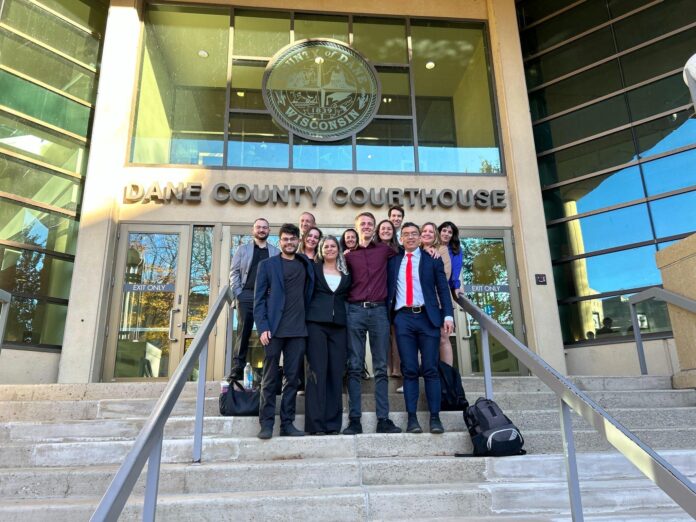
Last month, the University of Denver Sturm College of Law’s Animal Activist Legal Defense Project announced it helped get a special prosecutor appointed in Dane County, Wisconsin, to investigate and potentially prosecute criminal animal cruelty at Ridglan Farms. The clinic noted in its announcement that Ridglan is one of the last two remaining large breeders of dogs for animal experimentation in the country.
The law school clinic’s goal is to represent animal activists in a variety of proceedings, according to litigation fellow Steffen Seitz. While the clinic often helps with cases out of state, this case is a bit more unique.
“Typically, we don’t do this kind of thing where we’re proactively submitting a petition to the court or doing affirmative litigation,” Seitz told Law Week. “Mostly, what we do is defensive work, either representing activists in civil proceedings or in criminal proceedings.”
Ridglan breeds and sells thousands of beagles to biomedical researchers. Seitz explained that could include pharmaceutical companies and research institutions.
“None of these dogs are being sold as pets,” Seitz clarified. “They’re all being sold to institutions that conduct some [form] of experiments on them.”
Seitz explained that toxicology studies are a big category for the dogs Ridglan sells to researchers or institutions. “One example of that is detergents that are force-fed to the dogs to see what kind of reactions the dogs have,” Seitz said.
“The reason that places like Ridglan use beagles in particular is because they’re so docile and they’re so trusting of humans that you can essentially hurt them again and again, and they’ll continue to trust you,” Seitz said. “And so I think that’s just one of the things that I found really moving about this case is just the degree of betrayal of these dogs.”
According to Seitz, Ridglan has been accused of animal cruelty for years by animal activist investigators and former-employee whistleblowers. But despite years of repeated violations on state and federal inspection reports, Seitz said Ridglan has never been held liable.
“These dogs are kept in tiny cages. They never have access to the outdoors — or just solid ground beneath their feet — they’re kept on wire flooring their entire lives. Many of them develop infections. Many of them go psychotic from these conditions,” Seitz said.
According to a copy of the first amended petition provided to Law Week, Ridglan Farms is accused of regularly performing “cherry eye” surgery on beagles without anesthetics or veterinary supervision. The claim is backed by an affidavit from licensed veterinarian Sherstin Rosenberg, who reviewed footage, inspection reports and internal documents from Ridglan Farms, including information related to the performance of “cherry eye” surgery.
Rosenberg has served as an expert veterinary witness in nine criminal and civil cases and testified in legislative hearings about animal welfare issues, according to the court document.
Rosenberg explained in the petition that cherry eye is a congenital eye condition that causes eye redness and irritation in dogs. The petition asserts the procedure at Ridglan removes a portion of the eyelid without anesthesia or control of bleeding.
“I would characterize the cherry eye ‘surgeries’ performed at Ridglan as mutilations rather than surgeries,” Rosenberg stated in the petition. “The procedures are highly painful in the absence of anesthesia and do not benefit the dogs, who later suffer chronic painful eye conditions as a result of having their third eyelids removed.”
Ridglan is accused of also performing devocalization surgeries on the beagles without using appropriate sterile procedures, among other abuse allegations.
The law school’s team is working with a Wisconsin attorney to remain on the case pro hac vice. The team will assist in whatever way they can with any investigations, according to Seitz.
“Wisconsin has this unique procedure where, if you can show that the district attorney has refused to prosecute and that probable cause exists to believe that a crime has occurred, that the court can then appoint a special prosecutor,” Seitz explained. “That’s essentially the procedure that we’ve gone through, and now the court has actually agreed with us that there is probable cause to believe that Ridglan has committed a number of animal cruelty crimes and has gone to the length of actually pointing a special prosecutor to investigate and prosecute Ridglan.”
Petitioners in the case include Madison, Wisconsin, nonprofit Dane4Dogs Ltd., which seeks to end the breeding, sale and use of dogs and cats in experimentation; Wayne Hsiung, an animal cruelty investigator, former law professor at Northwestern School of Law and co-founder and executive director of The Simple Heart Initiative; and Wisconsin-based nonprofit Alliance for Animals, an animal rights organization formed in 1983.
Dane County Circuit Court Judge Rhonda Lanford on Jan. 9 granted the petition to appoint a special prosecutor, finding that the petitioners met their burden of proof under Wisconsin law.

